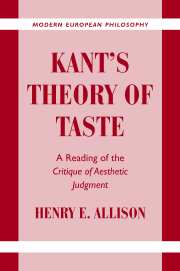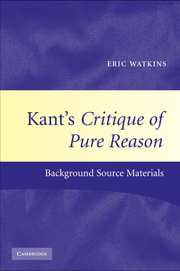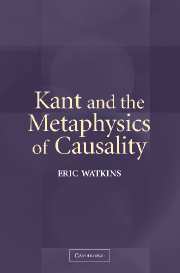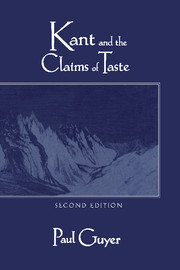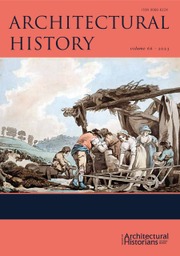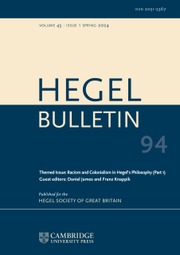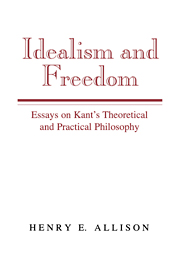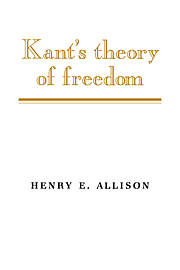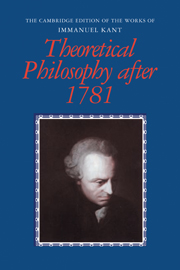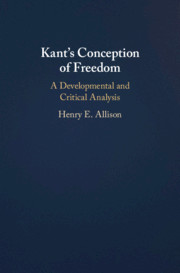Kant's Theory of Taste
This book constitutes one of the most important contributions to recent Kant scholarship. In it, one of the preeminent interpreters of Kant, Henry Allison, offers a comprehensive, systematic, and philosophically astute account of all aspects of Kant's views on aesthetics. An authoritative guide to the Critique of Aesthetic Judgment (the first and most important part of the Critique of Judgment), no one with a serious interest in Kant's aesthetics can afford to ignore this groundbreaking study.
- Allison is an internationally renowned Kant scholar
- Major new study of Kant's aesthetics that enhances the Cambridge Kant list
- Is being published at the same time as the new translation of Kant's aesthetic critique in the Cambridge Kant Edition
Reviews & endorsements
"...an important and original contribution to the study of Kant's aesthetic theory. ...essential reading for anyone who hopes to make a further contribution to the subject, as well as a valuable companion for readers approaching Kant's aesthetics for the first time." Inquiry
"This commentary on the 'Critique of Aethetic Judgment,' the first half of Kant's ^Critique of Judgement, has four parts.... The final part examines Kant's claim that a beautiful work of art must both seem like nature and be recognized as art." Choice
"In his discussion of the sublime, as well as at many other places, a certain virtue of Allison's style becomes apparent. He often reads Kant's arguments in their appropriate contexts. By carefully, skillfully, and convincingly exhibiting the different interests and aspects that Kant had in mind in different particular passages, Allison explains how such passages fthat seem to contradict one another, in fact do not. For this reason, as well as for the breadth of material covered, Allison's efforts are nothing short of commendable." Notre Dame Philosophical Reviews
"Since the structure of this section of the book closely follows Kant's own text, Allison's analysis can be used as a commentary, but its real value is in the originial interpretation he offers.... it will appeal to a diverse group, from specialists and students of aesthetics to the philosophically minded artist.... Anyone engaged in studies of Kant's theoretical, moral, or aesthetic philosophy will find much to be excited about." Philosophy in Review
"Allison's book is a major contibution to the already rich secondary material on Kant.... His book is indispensable for readers of Kant who wish to understand the third Critique from the inside." The Wordsworth Circle
"Kant's scholarship in all its aspects is a very healthy field in which much excellent and original work is being done. The writings of Henry Allison constitute a significant part of this excellence, and in that respect this book is entirely of a piece with his other influential work on this most influential of modern philosophers." - Allen B. Wood, Stanford University
Product details
April 2001Paperback
9780521795340
444 pages
229 × 155 × 26 mm
0.59kg
Available
Table of Contents
- Acknowledgments
- Note on sources and key to abbreviations and translations
- Introduction
- Part I. Kant's Conception of Reflective Judgment:
- 1. Reflective judgment and the purposiveness of nature
- 2. Reflection and taste in the introductions
- Part II. Te Quid Facti and the Quid Juris in the Domain of Taste:
- 3. The analytic of the beautiful and the quid facti: an overview
- 4. The disinterestedness of the pure judgment of taste
- 5. Subjective universality, the universal voice, and the harmony of the faculties
- 6. Beauty, purposiveness, and form
- 7. The modality of taste and the sensus communis
- 8. The deduction of pure judgments of taste
- Part III. The Moral and Systematic Significance of Taste:
- 9. Reflective judgment and the transition from nature to freedom
- 10. Beauty, duty, and interest: the moral significance of natural beauty
- 11. The antinomy of taste and beauty as a symbol of morality
- Part IV. Parerga to the Theory of Taste:
- 12. Fine art and genius
- 13. The sublime
- Notes
- Bibliography
- Index.

